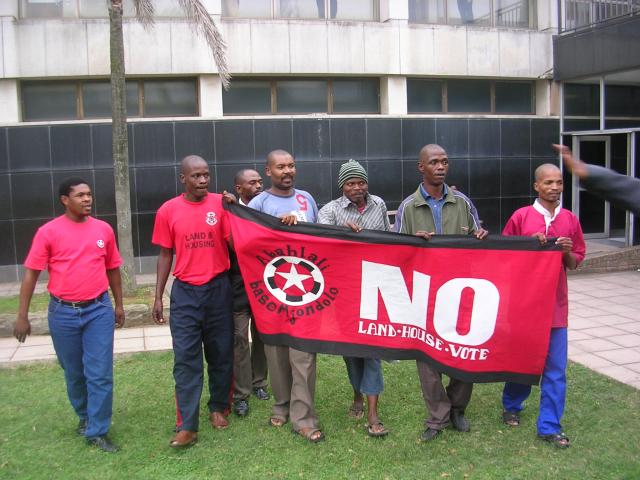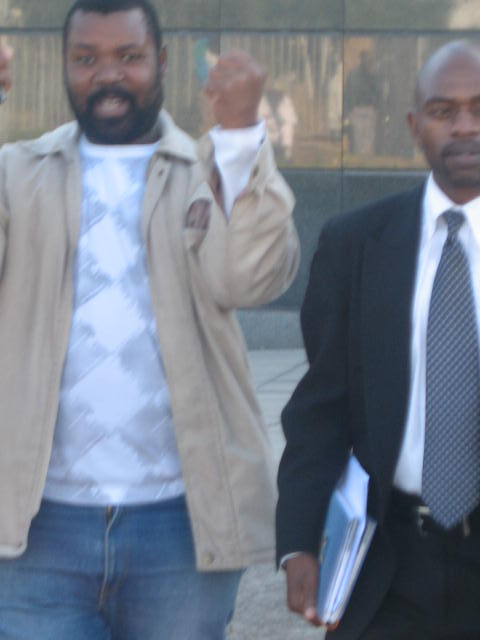Varieties of Criminal Behaviour in Durban
Unwanted and derided by their municipalities, the one billion people who live in the world’s shacks and slums are used to being called criminals. But the minute they stand up to such accusations, the minute that the poor reclaim their dignity, is the minute the state rains violence on their heads.
This is what members of the Durban Shackdwellers Movement, Abahlali baseMjondolo, have discovered over the past months of struggle. Recent events have confirmed this amply. Five members of the movement, all from the Kennedy Road settlement, are now in their second week on hunger strike in Durban’s notorious Westville Prison. The plight of the Kennedy Road Five indicate the South African government’s new plan to deal with the emerging politics of the poor: criminalise it.
The story begins on February 15, 2007. While out for a training jog, Thina Khanyile, a resident of the Kennedy Road settlement and a marathon runner, was attacked. His watch and shoes were stolen and he was stabbed eighteen times. He would have died had not a passing truck driver from the settlement picked him and brought him home, where help was called.
In the words of the Kennedy Road Development Committee, the democratically elected organisation representing shackdwellers from that settlement, this is what happened next:
“On 18 February a well known and dangerous criminal living in the settlement told people in the community that Khanyile’s attacker was in the Kennedy Road settlement. Those people restrained the suspect without causing any hurt to him and sent for Khanyile. Khanyile recognized him as the man who had almost killed him. At that point some people in the community began to assault the man who we now know was Mzwakhe Sithole from Ntuzuma.”
The committee continues:
“Members of the Safety & Security sub-committee in the Kennedy Road Development Committee immediately called the police. They called the police because even though there are such bad problems with most of the police here we still have to go to the few good police officers for serious cases like attempted murder and murder. When the police arrived the man looked to be fine. The crowd of more than 50 people all saw the police assaulting the man with kicks and punches as he walked to the van and climbed inside.”
Khanyile then tried, twice, to register a case against his attacker. Nothing was heard from the police until Human Rights Day on 21 March 2007. Nine residents were arrested at 3am. They were told that Sithole had died a week after his arrest and that they were being arrested for his murder. Five were later released after a two day women’s protest and then another person arrested. Among them was Khanyile himself, together with Cosmos Nkwanyana, S’thembiso Bhengu, S’bongiseni Gwala, and M’du Ngqulunga.
According to Police Supt Vincent Mdunge, the Sydenham police had rescued Sithole, who had been “seriously assaulted”, and “because of the seriousness of the situation, he was taken through to the police station for safety reasons”. One week later, according to the police, Sithole died right outside the station after a successful escape.
Five members of the Kennedy Road Development Committee who the police allege were involved with the assault now stand charged with murder. It is they who are behind bars and who, on April 1, decided to go on hunger strike to bring attention to their plight, and to the open repression of democratic, but non-state-authorised, organising in Durban.
The Sydenham police, under the command of Senior Superintendent Glen Nayager, remain adamant that they are serving the causes of justice. The story, just to be clear, it this: Sithole was assaulted so badly that five residents of the Kennedy Road settlement are now charged with his murder. On the other hand, a week later Sithole was spry enough to break out of a high-security holding facility at Sydenham Police Station, to which he had been taken ‘for his own safety’, only then to drop dead just outside the gates, where Nayager and his men rushed to save him but, alas, too late.
“It’s the same lies as they told under apartheid”, said one shackdweller, who did not want to be named for fear of reprisal.
Shackdwellers offer another story. They point to the fact that, other than Khanyile, the other arrested men are all key members of the Kennedy Road Development Committee, an organisation that has been systematically targeted by Spt Nayager. Shackdwellers observe that one of the arrested men, M’du Ngqulunga, was only himself detained and charged after claiming at a protest the following day that the arrests were political. Local residents also recall the history of arbitrary arrests of shackdwellers by Spt Nayager, and the number of shackdwellers who have been brutally beaten by the Sydenham Police. They also note that Spt Nayager’s arrests are always accompanied by tirades of political abuse and public promises to drive the ‘Red Shirts’ –the ANC’s name for Abahlali baseMjondolo – out of this area.
The hunger strikers’ statement says that they are political prisoners who are protesting their wrongful arrest, and demanding their immediate release. Furthermore they do not accept that they are prisoners of the state, and say that refusing food is a way of asserting their dignity and refusing to offer any consent to their imprisonment. Their hunger strike rejects the criminalization of poor peoples’ politics.
Anglican Bishop Ruben Phillip visited the hunger strikers and told journalists that he was deeply moved and humbled by their courage and conviction. He also said that he fears for their lives, especially those of the two who were seriously unwell when the hunger strike began. During this visit, M’du Ngqulunga explained that Nayager had personally tried to force him to shout ANC slogans while he was detained in Sydenham but that he had refused.
The community has twice tried to march on Sydenham Police Station in protest at the arrests. The first march later on the morning of the arrests was broken up by the police. Spt Nayager illegally banned the second march but, at a meeting with Abahlali leaders held under pressure from a vigorous protest, eventually conceded that the law unequivocally allowed for 14 or fewer people to legally present him with their demands.
The community-delegated representatives were able to present him with their memorandum, which included documentation of incidents of racism, theft of photographic evidence, threatening journalists, and ignoring “real crimes against shack dwellers but acting as though it is a crime for shack dwellers to speak for themselves”.
The community is still waiting for word from the hunger strikers. They have been able to raise enough money for bail if this is eventually awarded. But they are asking for funding to support the families of the hunger strikers, and possibly for the trial.
Raj Patel is a Visiting Scholar at the Center for African Studies, University of California at Berkeley. Perhaps more to the point he once had his camera stolen by Superintendent Nayager.


